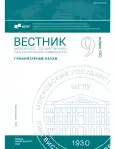NATIVE SPEAKER AND NATIVE LANGUAGE: TRANSFORMATIONS OF THE CONCEPTS
- Authors: Guermanova N.N.1
-
Affiliations:
- Moscow State Linguistic University
- Issue: No 9(890) (2024)
- Pages: 16-22
- Section: Linguistics
- URL: https://bakhtiniada.ru/2542-2197/article/view/297405
- ID: 297405
Cite item
Abstract
The author analyses the causes of the changes in the contents and the axiological component of the notions ‘native language’ and ‘native speaker’ in sociolinguistics in the 20-21 centuries. It is shown that in the epoch of mass migration the four basic criteria defining the native language (origin, competence, function, identification) often come in collision, which makes sociolinguists drop the prototypical models of the ‘native language’ and ‘native speaker, relying instead on models based on one criteria only.
About the authors
Natalia Nikolaevna Guermanova
Moscow State Linguistic University
Author for correspondence.
Email: nata-germanova@yandex.ru
Doctor of Philology (Dr. habil.), Associate Professor, Professor at the Department of General and Comparative Linguistics, Moscow State Linguistic University
Russian FederationReferences
- Bonfiglio, Th. P. (2010). Mother Tongues and Nations: The Invention of the Native Speaker. New York: Walter de Gruyter.
- Hackert, S. (2012). The emergence of the English native speaker: A chapter in nineteenth-century linguistic thought. Boston–Berlin: Walter de Gruyter.
- Ushinsky, K. D. (1948). Rodnoe slovo = Native word. In Esssays (vol. 2, Pedagogicheskie stat’i. 1857–1861, pp. 544–574): in 10 vols. Moscow ; Leningrad: Izdatel’stvo akademii pedagogicheskih nauk RSFR. (In Russ.)
- McArthur, T. (1998). The English Languages. Cambridge: Cambridge University Press.
- Blommaert, J. (2010). The sociolinguistics of globalization. Cambridge: Cambridge University Press.
- Skutnabb-Kangas, T., Phillipson, R. (1989). Mother tongue: the theoretical and sociopolitical construction of a concept. Status and Function of Languages and Language Varieties (pp. 450–477). Berlin – New York: Mouton de Gruyter.
- Slavkov, N., Melo-Pfeifer, S., Kerschhofer-Puhalo, N. (Eds.). (2021). The changing face of the “native speaker”: perspectives from multilingualism and globalization. Boston – Berlin: Walter de Gruyter, Inc.
- Davies, A. (2013). Is the native speaker dead? Histoire Épistémologie Langage, 35(2), 17–28.
- Barinova, P. S. (2022). First language acquisition as a domain of French psycholinguistics. Vestnik of Moscow State Linguistic University. Humanities, 6 (861), 70–77. (In Russ).
- Lakoff, G., Johnson, M. (2008). Metaphors we live by. Chicago: University of Chicago Press.
- Coppieters, R. (1987). Competence differences between native and near-nativesp eakers. Language, 63, 544–57.
- Götz, S. (2013). Fluency in Native and Nonnative English Speech. Amsterdam: John Benjamins Publishing.
- Guermanova, N. N. (2011). Teoriya i istoriya literaturnogo yazyka v otechestvennom i angloyazychnom yazykoznanii = Theory and History of Standard Language in Domestic and English Linguistics. Moscow: Librokom. (In Russ).
Supplementary files










